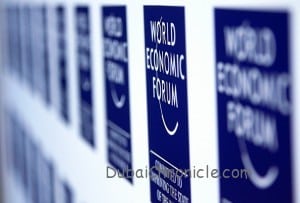
- New risk analysis by the World Economic Forum shows risk perception by regional business leaders focuses on economic, governance, and security issues
- Risks ranked as most likely by global stakeholders over next decade —those relating to climate change—not top of mind for MENA executives
- Analysis uses global and national survey data to offer a “glocal” risk perspective on the region
Business leaders in the Middle East and North Africa view economic and governance issues as the primary risk in the region, but may underestimate the risk of climate change. That is the finding of a new analysis of regional risks by the World Economic Forum.
The Middle East and North Africa Risks Landscape comes at a pivotal time, as the Fourth Industrial Revolution and geopolitical fractures combined with economic and security challenges within some countries are creating a complex risk environment for the region. The analysis looks at the impact on the region of the global risks of geo-economic division and climate change, and of state-specific risks of unemployment, non-diversified economies, governance challenges and terrorism.
The analysis draws on data from the Forum’s Global Risks Perception Survey 2018-2019, in partnership with Marsh & McLennan Companies and Zurich Insurance Group. The survey polled 916 experts and decision-makers across the world, and approaches risk from the standpoint of global stakeholders and regional business leaders.
Global respondents to the Global Risks Perception Survey 2018-2019 ranked “economic confrontations between major powers” as the greatest risk for 2019 and climate-change-related issues as the leading risks over the next 10 years. Both issues hold risk for the MENA region, home to trade-dependent economies as well as coastal ports that would be adversely affected by rising sea levels caused by climate change.
In addition, the analysis draws on data found in the Forum’s Executive Opinion Survey 2018, which polled 12,548 business leaders from around the world, including those in 15 MENA countries: Algeria, Bahrain, Egypt, Islamic Republic of Iran, Israel, Jordan, Kuwait, Lebanon, Morocco, Oman, Qatar, Saudi Arabia, Tunisia, United Arab Emirates and Yemen.
Notably, business leaders in the MENA region who responded to the Executive Opinion Survey did not rank environmental change as a risk to doing business – a potential blind spot given the potential implications of global warming. Instead, business leaders ranked economic and governance-related issues – “energy price shocks” and “unemployment or underemployment” – as well as “terrorism” as the top three risks to doing business in the region.
“In today’s interconnected world, risks no longer stop at borders on a map or are confined to one industry in an economy,” said Mirek Dusek, Deputy Head of the Centre for Geopolitical and Regional Affairs and Member of the Executive Committee at the World Economic Forum. “Because global risks are shaping regional landscapes and vice versa, it is important to take a ‘glocal’ approach to risk assessment. Our analysis offers a combination of global and local analysis so that stakeholders can gain a better understanding of what is necessary for risk mitigation and resiliency.”
The analysis is being released as more than 1,000 global and regional leaders gather at the Dead Sea in Jordan for the World Economic Forum on the Middle East and North Africa, taking place on 6-7 April. The meeting is held in partnership with the King Abdullah II Fund for Development (KAFD), and offers the opportunity to address the risks spotlighted in the analysis, many of which require multilateral cooperation across regions and industries to solve.
The World Economic Forum on the Middle East and North Africa was last held in Jordan in 2017 in partnership with KAFD. The meeting will mark the 10th hosted by Jordan since it was first convened at the Dead Sea in 2003.




































